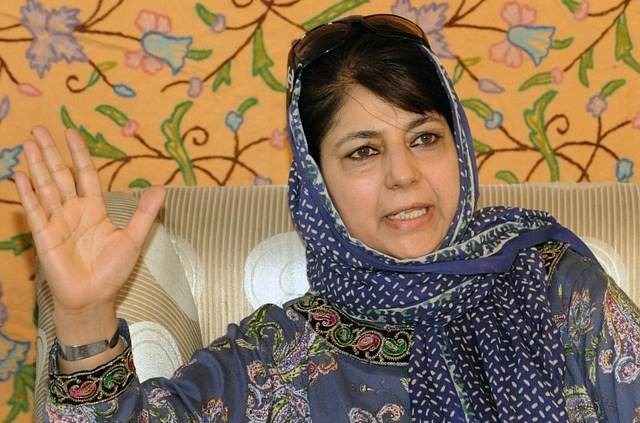
Self-Rule Theory of PDP Should Be Opposed, It Negates India’s Contribution
Jammu and Kashmir Chief Minister Mehbooba Mufti on 28 May said that the self-rule is the battle-cry and watchword of the People’s Democratic Party (PDP).
The PDP has been seeking to convince everyone since 2006 that self-rule doctrine has the potential of defusing tensions between India and Pakistan, and ending violence in Kashmir.
The self-rule doctrine, like the greater autonomy doctrine of the National Conference (NC), is another charter of bondage for the people of Jammu province and trans-Himalayan Ladakh.
The message of the PDP leaders is loud and clear - it wants a dispensation that is outside the Indian constitutional framework.
Jammu and Kashmir Chief Minister Mehbooba Mufti on 28 May said that the self-rule is the battle-cry and watchword of the People’s Democratic Party (PDP) and that she will leave the chair in case she failed to fulfill her father late Mufti Mohammad Sayeed’s vision. She made this statement while rebutting the charge of Leader of Opposition in the Legislative Assembly Omar Abdullah that she has compromised her party’s stand on self-rule doctrine,
“I will not hesitate to step down if commitments made in the Agenda of Alliance with the BJP do not materialise and the chair becomes an ‘impediment’ in fulfilling her father Mufti Mohammad Sayeed’s ‘vision’ for Jammu and Kashmir,” she said in her first address as Chief Minister in the J&K Assembly. “Safeguarding Article 370 that gives special status to the State was included in the Agenda of Alliance, which was no small feat,” she further said, adding that “self-rule” was imperative for “restoration of peace in the State”.
The PDP has been seeking to convince everyone since 2006 that self-rule doctrine has the potential of defusing tensions between India and Pakistan, and ending the ongoing violence in Kashmir. They have been also arguing that the doctrine will resolve “regional tensions” in the State of Jammu and Kashmir as it has an “in-built mechanism” that prevents any one region from exploiting others.
But the self-rule doctrine is fundamentally bad, reactionary, retrograde and highly damaging to the vital interests of India and its people in Jammu & Kashmir. It is nothing but a replica of the two-nation theory that resulted in the communal partition of India in 1947 and consumed millions of lives while displacing population on an unprecedented scale.
The
self-rule doctrine, like the greater autonomy doctrine of the National
Conference (NC), is another charter of bondage for the people of Jammu province and trans-Himalayan
Ladakh.
It allows Pakistan to share equal sovereign powers with India in Jammu & Kashmir, thereby negating all that the Indian nation did in the past six decades to integrate the State into the Union. The doctrine is a blueprint for the Balkanisation of India.
It
will lead to the emergence of a system under which New Delhi will have no power whatsoever in
the State of Jammu & Kashmir. Self-rule, like greater autonomy, will take us to the medieval ages known for oppression, religious
intolerance, conversions, and destruction of Indian symbols of
civilisation. This is no exaggeration.
The
implications of self-rule suggest that there is no fundamental difference
between what PDP leaders are advocating and what Islamabad is seeking to achieve. On 12 November, 2006, at the Centre for Strategic and International Studies in Washington, DC, Mufti Mohammad Sayeed, who was then leading a delegation to the US, said:
Conceptually, the challenge in Jammu and Kashmir is to integrate the region without disturbing the extent of sovereign authority over delimited territorial space. There is no need to negate the significance of the Line of Control as territorial divisions, but it is imperative to negate its acquired and imputed manifestation of State competition for power, prestige, or an imagined historical identity. The idea is to retain the former and change the latter. Therein lies the key to the solution of Jammu and Kashmir dispute...The operational challenge in Jammu and Kashmir is to establish innovative institutional arrangements that have a political, economic and security character. The two countries — India and Pakistan — have to resolve the very difficult problem of ‘domestic’ integration within a split international political and economic structure. Our basic premise is that the search for solution to the issue of Jammu and Kashmir is the search for an inter-nation State, but still has a supra-national basis. To put issue in analytical terms, we have to find ways and means of ‘sharing sovereignty’ (with Pakistan)....
He further said:
At a practical level, it should be obvious that the Jammu and Kashmir issue cannot be solved exclusively on an inter-State level (within India or within Pakistan). It requires a combination of intra-State (across India and Pakistan) and inter-State (within Jammu and Kashmir and cross-Line of Control) measures.
The
resolution on self-rule adopted by the PDP executive committee under Mufti Sayeed
in Jammu on 11 February, 2007, also said the
same thing and demanded withdrawal of the Indian Constitution from Jammu and Kashmir. In
this regard, the resolution said:
The PDP recognises that the people of the State (read: Kashmiri Sunnis), unlike other States, which acceded with the Union of India, were assured and promised internal sovereignty and self-rule by allowing the State to have its own Constituent Assembly, its own Constitution and flag and a vast degree of self-governance (read: semi-independence). This was reflected in Article 370 of the Constitution of India. Unfortunately, this Article, which was meant to be a bridge between the Union of India and the State of Jammu and Kashmir, has been used as one way window to undermine the internal sovereignty of the State.
The
message of the PDP leaders is loud and clear. It wants a dispensation that is
outside the Indian constitutional framework, with India
and Pakistan sharing
sovereignty in Jammu and Kashmir,
plus the State’s demilitarisation. This is unacceptable. All right-thinking
people must combat the pernicious self-rule doctrine.